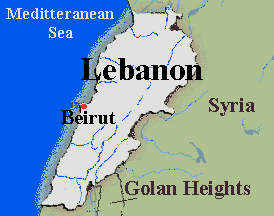Lebanese scam victims turn up heat on Hezbollah
 Maaroub, Lebanon - The case of a group of southern Lebanese villagers who lost their life savings to a man billed as the country's version of US swindler Bernie Madoff is starting to prove uncomfortable for Hezbollah, a militant group that is also one of the country's major parties.
Maaroub, Lebanon - The case of a group of southern Lebanese villagers who lost their life savings to a man billed as the country's version of US swindler Bernie Madoff is starting to prove uncomfortable for Hezbollah, a militant group that is also one of the country's major parties.
Shock continues to prevail among the villagers of Maaroub as they come to terms with the fact that Salah Ezzeddine, a Lebanese Shiite businessman, whom they trusted to invest their life savings, turned out to be a fraud.
Ezzeddine, who hails from the same town east of Tyre, is a well- known Shiite businessman with close links to the militant group Hezbollah. Those close links are now growing troublesome for the party as Ezzedine stands accused of wiping out thousands of Lebanese investors.
"What can I say? I lost my lifetime savings with a man I trusted with my life? I am now broke and trying to see what do!" said Ali, a resident of Maaroub, who preferred not to give his last name.
Yussef Faour, the deputy mayor of Maaroub, who was described by Ali as a member of Hezbollah, was Ezzedine's business partner. Faour was also arrested and charged with fraud, embezzlement, distributing bounced checks and violating Lebanese fiscal law.
"Faour was the man in convincing most villagers in southern Lebanon, who has some money, to invest with Ezzeddine," Ali said angrily.
"I call on Hezbollah leaders to look into this case and help us, because this man and his partner were linked to the group and that is why we invested our money with them," he added.
Lebanese media reports, which could not be confirmed by the Hezbollah press office, reported that Hezbollah promised the victims of Ezzeddine with compensation.
In August, Ezzeddine surprised his investors by declaring bankruptcy, leaving thousands of Lebanese, mainly Shiites citizens, unemployed in Beirut's southern suburbs as well as in south and east Lebanon.
Ezzedine, a well-known name among the Shiite community in Beirut's southern suburbs, was the owner of Dar Al-Hadi Publishing House, which publishes religious Shiite books and books written by Hezbollah officials. He also owns al-Hadi TV for children, which is based in the southern suburbs and is a hotbed of the militant group.
Ezzeddine named his publishing house and TV station after the late son of Hezbollah chief Sheikh Hassan Nasrallah, Hadi, who died in fighting against Israeli occupation in 1997.
According to a Lebanese judicial source, who spoke on condition of anonymity, Ezzediine had business interests in oil and iron in areas in Eastern Europe, but lost a lot of money after oil prices dropped last year. He then started to take money from Lebanese investors and charities, promising them up to 40 per cent interest on their deposits.
"Since the man's name was linked to Hezbollah, people trusted him and started investing vast amount of money with him," the source said.
A Lebanese security source said the security appartus of Hezbollah was able to locate Ezzeddine in Lebanon, as he was trying to flee the country, and handed him over to the Lebanese authorities for trial. They acted after receiving complaints that he Ezzeddine was not paying fees due to investors.
Last week, in a speech in Beirut's southern suburbs, Nasrallah denied the party had any links to Ezzedine. But circles close to the group said the issue of Ezzeddine's bankruptcy has prompted Nasrallah and other Shiite officials close to the militant group to follow the case closely, as most of his victims were from the Shiite community.
"The issue has caused an embarrassment to Hezbollah leaders, because they were always regarded among their community (Shiites) to back honest and uncorrupt people," said the source.
"Mostly Shiites real estate owners and traders in Lebanon, were Ezzeddine's victims," a banker in Beirut's southern suburbs, who requested anonymity said.
"They are mainly followers or officials from Hezbollah," he said without elaborating.
Hezbollah lawmaker Hussein Hajj Hassan, was also a victim of Ezzedine's scheme. According to the banker, Hassan filed a complaint against Ezzeddine for bouncing a 200,000 dollar check.
Nassib Goberil, a financial analyst in Beirut, said people investing money with Ezzeddine should have been aware because "such high returns, like the promised 40 percent by Ezzeddine on an investment, are rare."
The exact amount Ezzedine lost is still unclear. Lebanese media reports estimated it at 1.9 billion dollars.
Goberil stressed that Lebanon's banks did not invest with Ezzedine and that is why they were not be affected by the bankruptcy.
"It was us, medium-range investors, who lost everything," said Ali.
Ezzeddine's case is compared in Lebanon with that of Bernard Madoff, the New York financier whose multibillion-dollar scheme wiped out thousands of investors and charities worldwide. Madoff was sentenced last June to 150 years in prison. (dpa)